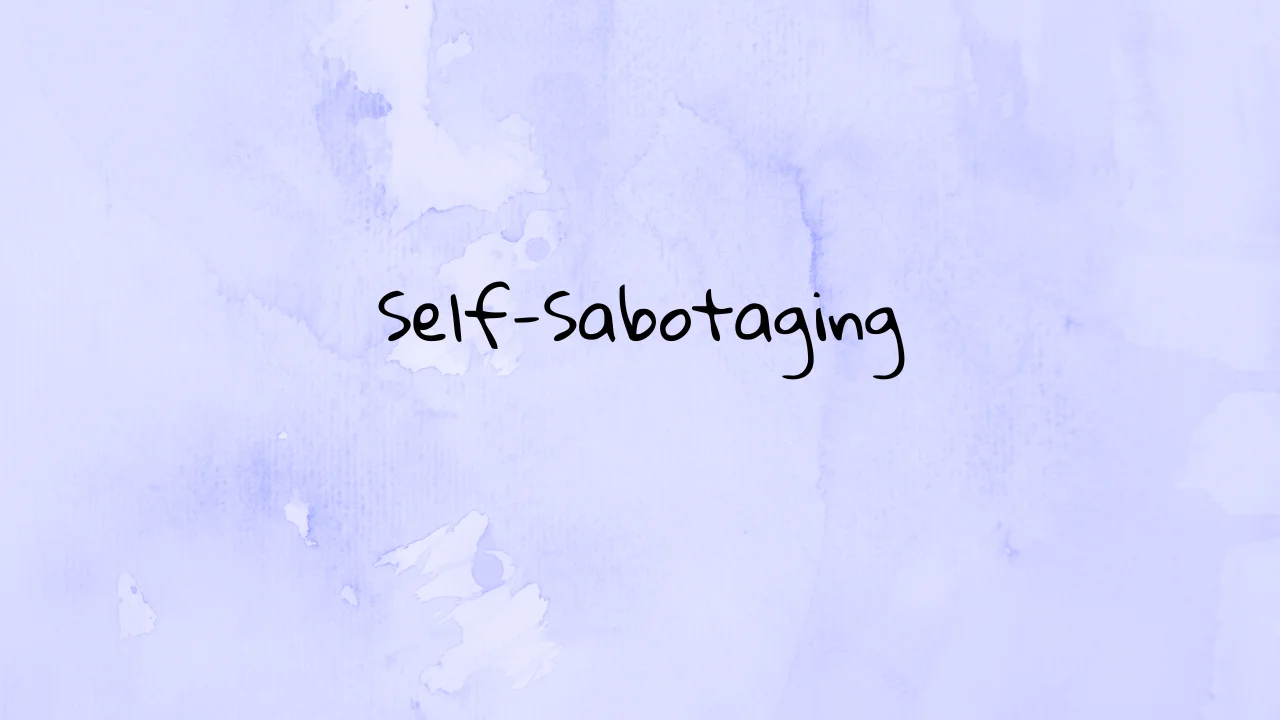
Start feeling better today!
Connect with your therapist today and take control of your life like our 850.000 happy clients.
Get StartedWhat is Self-Sabotage?
Sabotage is the act of destroying or preventing something from happening, usually covertly. Self-sabotaging or self-handicapping, on the other hand, is used to express the destructive behavior of a person who has the necessary skills and capacity to complete a job, but has doubts about doing the job and does not complete the job by justifying this doubt.
Individuals are deemed to have sabotaged themselves when they unwittingly harm themselves psychologically with negative habits and behaviors1. Simply put, self-sabotage occurs when one aspect of your personality clashes with another aspect of your personality2.
Symptoms of Self-Sabotage
- Procrastinating the things that you have to do
- Inability to start and finish tasks or projects
- Coming to a halt for no logical reason while trying to achieve your goals
- Thinking that you are inadequate and unworthy of success
- Thinking negatively about yourself all the time
- Adopting self-destructive behaviors
- Ruining relationships that are going very well by suddenly doing bad things
- Being a perfectionist

A lot of people are probably self-sabotaging and have experienced periods of similar behavior, but some people are more prone to self-sabotage than others, and they don't even acknowledge or even realize that they're doing it. However, this situation is not something to be justified as ordinary by saying, "It happens to everyone." On the contrary, it can reinforce individuals' feelings of worthlessness and cause negative thoughts to become fixed. Signs of self-sabotaging should be approached sensitively because it can negatively affect people's daily lives and cause cognitive problems1, 2, 3.
What Are the Causes of Self-Sabotage?
Self-sabotaging is most often caused by the following:
- Adaptation
- Learning
- Self-fulfilling prophecies
- Emotional masochism
- Need for control
Adaptation
Actually, the most obvious reason for self-sabotage is adaptation. If self-sabotaging behaviors helped you get over a traumatic event or a bad relationship in the past, they may have become a habit or a way to protect yourself and stay out of bad situations.
Learning
All our behaviors, including self-sabotage, are acquired through learning. Dysfunctional behavior patterns learned early in life can be reinforced by repetition as they encounter similar events4, 5.
Self-Fulfilling Prophecy
Individuals who think they are inadequate and have beliefs that they do not deserve positive things also have low self-esteem and are likely to experience self-confidence problems. Because of their low self-esteem and lack of self-confidence, they may contribute to reinforcing their low self-esteem by sabotaging their goals, lives, or achievements1, 3.
Emotional Masochism
Assuming that individuals take emotional pleasure from being and feeling unsuccessful and inadequate, emotional masochism is also included among the reasons for self-sabotaging3.
Need for Control
Perfectionists spend a lot of time keeping everything under control and planning down to the smallest detail. Ultimately, they are unable to start or finish work on time because they focus on planning, thus sabotaging themselves5.

How to Overcome Self-Sabotage
We've listed many examples of self-sabotaging behaviors. Not everyone has them all at once, or you may have your own unique ways of sabotaging yourself. The benefits of our suggestions below may also vary from person to person and situation to situation. You can try them all and see which ones are most useful to you.
- First, you can start by noticing what these behaviors are, because noticing can prevent you from continuing to sabotage yourself unconsciously1.
- Try to understand the emotions that triggered your self-handicapping behavior. When the nurturing point is found and the right care is given, self-destructive behavior may stop. This is because self-destructive behavior is usually accompanied by feelings like anger, anxiety, worthlessness, and inadequacy.
- Thoughts and beliefs are just as important as emotions when it comes to self-sabotaging behavior. This is because your negative emotions are often caused by your irrational thoughts and beliefs, which then lead to your bad behavior.
- Recognize your irrational thought patterns and behaviors. As you become aware of them, it will be easier to combat your negative feelings, thoughts, and behaviors. Try to change any negative things you notice and get help from a professional1.
- To better manage your time while working, you can use the Pomodoro Technique. You can apply the 2-minute rule when starting your work.
- As you become aware of your problems and begin to overcome them, be your biggest supporter. You can avoid situations and people that sap your motivation, and you can remove distracting stimuli from your life for a while1, 2.
Sources
- Self-Sabotage - Stress Management Training from MindTools.com
- Why Are You Self Sabotaging Your Productivity? from trello.com
- How to recognize the signs of self-sabotage | Camino Recovery Spain
- Self-Sabotaging: Why We Do It and How to Stop the Cycle verywellmind.com
- https://positivepsychology.com/self-sabotage





